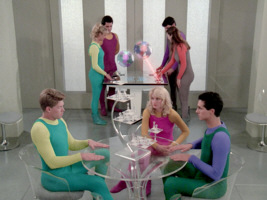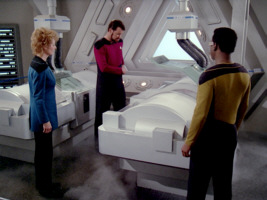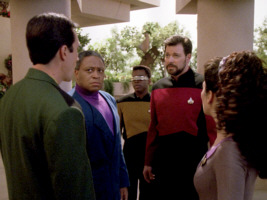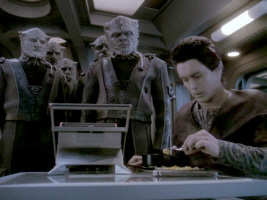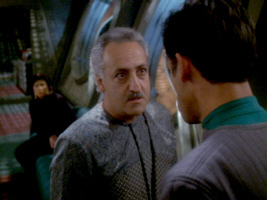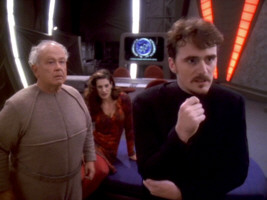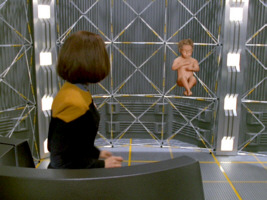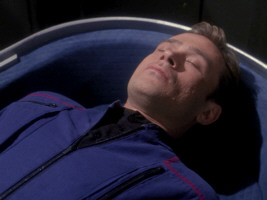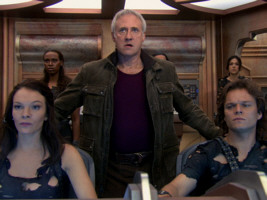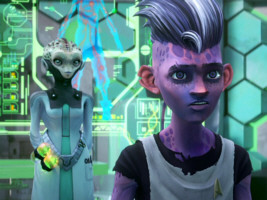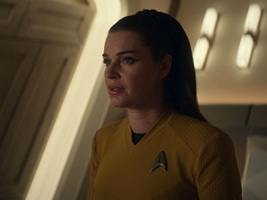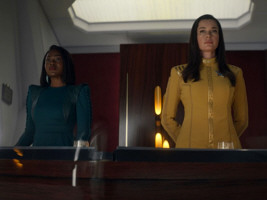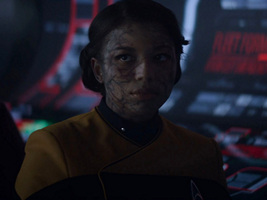Genetic Engineering and Cloning
Genetic engineering or cloning are popular topics in science fiction. They were featured several times in Star Trek, with a focus either on the dangers of "playing god" in general and on the rightfulness of such a procedure, or on the subjects/victims in particular. This article sorts out the canon evidence, points out inconsistent statements and attempts to outline a general trend of how Star Trek deals with the topic.
Analysis
TOS: Space Seed
Genetic engineering is the subject of a Star Trek episode for the first time in TOS: "Space Seed", in a plot thread that is continued in "Star Trek II" (well, and with a very different Khan in "Star Trek Into Darkness"). Khan Noonien Singh and his company were genetically engineered to be superior to other human beings in most regards. It is uncertain to what extent their physical and mental strength has been enhanced, what was the actual purpose of their creation and what has become of possible other genetically engineered humans of Khan's time. But this isn't really of importance in the course of the episode and the movie. What we learn is that Khan and his followers assumed dictatorial powers in several countries of Earth and were finally defeated in the Eugenics Wars. Clearly the idea of "super-humans" frightens most of the Enterprise crew, although they know of Khan's regime at most from history lessons. In any case his grandiose habits and his fascist stance that becomes obvious in the dinner with the ship's crew ("We offered the world order!") clearly demonstrates that his idea of a human society is a very different one than the peaceful Federation.The impression is created that genetically improved humans have an intrinsic ambition to rule over naturally gifted humans. Overall, the criticism about genetic engineering in the episode is quite concrete. Rather than a general condemnation of tampering with human DNA, the result is criticized here: Genetic engineering, although it might be tempting to improve humanity, goes along with bad side effects and creates criminals. Only Lt. Marla McGiver, who falls in love with Khan, is positive about Khan's nature, but she is rather love-sick than providing a rational view on genetic engineering.
TNG: Unnatural Selection
The second-season episode "Unnatural Selection" is TNG's first and worst take on genetic engineering. The stance put forward here is worrying, to say the least. On the remote outpost Gagarin IV, scientists are breeding "perfect" children. These children grow extremely fast, they are immune against any known illness, and they even possess telepathic or telekinetic abilities. The scientists keep the children in isolation and in spite of all the obvious "success" they don't really know what they are doing by messing with their DNA. That is why they contract the illness of accelerated aging that kills the crew of the USS Lantree.The practice of these scientists is comparable to that of the creators of Khan, maybe worse. But no one of the Enterprise crew decidedly condemns the irresponsible and inhumane experiments, which we would expect to be outlawed, even if certain mild forms of genetic engineering were legal in the Federation (which they aren't, as we will learn in DS9: "Dr. Bashir, I Presume?"). Captain Picard and most of the rest are at most skeptical, and Dr. Pulaski is even fascinated by the idea of breeding humans without illnesses and with all kinds of funny features.
TNG: Up the Long Ladder
Quite the opposite opinion on genetic engineering (this time on cloning, to be precise) is put forward in TNG: "Up the Long Ladder". The Enterprise crew become suspicious about the Mariposans when they learn that their survival has been achieved through cloning. This alone does not bother the crew very much, though. But when Riker and Pulaski discover that they have been cloned by the Mariposans against their explicit will, they don't hesitate and agree that Riker should kill both clones.It is true that Riker's and Pulaski's right of individuality and of integrity, as it is almost certainly granted by Federation laws and probably stated in the constitution, has been violated. Nevertheless, killing one's clone can well be regarded as an act of murder, no matter if the clones are still developing, are not yet "programmed" and therefore not yet self-aware - and no matter whether cloning is legal or not. Especially Pulaski's stance is peculiar, bearing in mind how she was still rather positive about the bred über-children in "Unnatural Selection". In retrospect, she was either overly hypocritical about genetic engineering as a general concept, or just overly selfish when it came to her personal rights.
TNG: The Hunted
Genetically enhanced soldiers appear in TNG: "The Hunted". They were designed by the Angosians to be the ultimate soldiers with supernatural abilities, and they were never meant to be integrated into the Angosian society. Picard condemns the practice of breeding soldiers, but ultimately it is once again mostly the unfortunate result of genetic engineering and not the practice itself that is in the focus of interest, as the soldiers are trying to take over the planet. Still, there is a reconciling tone in the end when it becomes obvious that the super-soldiers are not intrinsically bad and that there may be a peaceful solution of the conflict.
TNG: The Masterpiece Society
This episode shows a human colony on Moab IV that is based on a genetic balance, meaning that each member of this society is bred to have certain abilities and characteristics. Whilst none of them is supernatural, selection is clearly a form of tampering with human life instead of leaving that to nature. This is the most controversial treatise on genetic engineering so far, even though once again the practice itself is not in the center of interest. Almost everyone one the Enterprise is not fond of the idea that the natural development of a human being should be replaced with a predetermined career. The critics include Picard who always votes in favor of individuality (especially after his Borg experience), Worf who is opposed to anything unnatural, as well as Geordi who quickly recognizes that disabled embryos would be denied their right to live. Only Deanna is attracted by the perfect harmony of the colony, which may also have to do with her interest in the colony leader Aaron Conor.But the focus of attention shifts in the following, when it becomes clear that the alleged paradise has been contaminated. It turns into one of the many episodes that revolves around the Prime Directive, even though it purportedly wouldn't apply here because the settlers are human. In the eyes of the colonist Martin, disturbing the colony's genetic balance by letting some of the colonists leave is even worse than its destruction. This is clearly hypocritical, because the colony would hardly need a genetic balance if all were doomed to die, as Worf and Riker correctly object, but even Picard acknowledges that a paradise is being destroyed. Still, Picard's stance does not really touch the issue whether genetic engineering is wrong or right. Picard merely acknowledges that, irrespective of its inception, this colony has developed its own characteristics, its own culture that deserves to be preserved.
DS9: A Man Alone
The episode creates the impression that cloning is anything but commonplace, although the technology is rather well-known. The ethical impact of cloning is not really discussed, as it is just an aspect of a murder mystery here. Yet, we learn that killing one's clone is punishable as murder under Bajoran law (as opposed to the Federation, thinking of what Riker did in TNG: "Up the Long Ladder"). It is mentioned only in a side note that the clone of Ibudan that Bashir created in this episode is kept alive and is allowed to conduct a normal life. We don't learn far he was developed in the end, how he would gain the necessary knowledge and experience and whether Bashir has a bad conscience for playing god, even if it was unwittingly.
The Jem'Hadar
The Jem'Hadar are a completely artificially generated biological species bred by the Founders and addicted to Ketracel white. There is no natural procreation, no other nourishment but white, and Jem'Hadar seem to have no hobbies or interests aside from fighting, as seen in many episodes, especially DS9: "To the Death". As they are fighting for the Dominion, Jem'Hadar are an exception among the genetically enhanced individuals. Starfleet has no bad conscience to let their mortal enemy die by destroying white facilities like in DS9: "A Time to Stand", much less to allow the whole race to become extinct, as there is no natural reproduction.The Vorta
The Vorta are another race created by the Founders. If we believe Weyoun (who may have told Odo a lot of crap in DS9: "Treachery, Faith and the Great River" though), they have been developed from a primitive ape-like race and are reproduced by cloning. Damar, Worf and Garak obviously had no bad conscience killing various Weyoun clones. But we shouldn't assume that the life of a clone was of lower value to them. Rather than that, it was made easy because of the many crimes that Weyoun was responsible for, of a kind that could have been committed by a "natural" lifeform just as well.
DS9: Dr. Bashir, I Presume?
Here it is revealed that Julian Bashir has been genetically enhanced at the age of five with the illegal "accelerated critical neural pathway formation". This is the first time that a form of genetic engineering is explicitly said to be outlawed in the Federation, the Eugenics Wars being mentioned as one reason for the restrictive laws.Whilst this is not necessarily inconsistent with previous episodes, it lets appear the experiments in TNG: "Unnatural Selection" in an even worse light. If as little as the improvement of young Julian's abilities is illegal (and will get his father into prison for two years), what about the irresponsible experiments of the scientists on Gagarin IV? Not only should Picard have been disgusted, but it would have been his duty to put all the scientists under arrest for their criminal activities.
The case of Bashir's parents, on the other hand, may be understandable to a certain extent. As it is mentioned in the episode, Richard Bashir was frequently switching jobs, and he was obviously never really successful in and content with his life. No one needs to be poor or underprivileged in the 24th century, but with all the wealth and social security it may be still important to have certain capabilities for personal happiness - and to improve oneself, as Picard would put it. When the Bashirs saw that their son's abilities were below average, they decided to change that. Although the result is clearly unnatural, Julian is quite different from any genetically enhanced human being shown so far. It wasn't even noticed by anyone until he was forced to admit it in "Dr. Bashir, I presume" (although, in retrospect, there is almost no way to explain why he didn't make use of his improved senses in one emergency or another).
The "Jack Pack"
As opposed to Dr: Bashir, many genetically enhanced humans are emotionally unstable like Jack, Lauren, Patrick and Sarina, who appear in DS9: "Statistical Probabilities" and once again in DS9: "Chrysalis". They were subject to similar treatments like young Julian, but it failed in their cases, making them geniuses who are not fit for social life and who spend their lives in what appears to be a mental hospital. In this regard they are a bit like Khan, the Angosian super-soldiers or the Jem'Hadar, only that Khan was clearly villainous and the soldiers were ruthless and violent by design. Still, an overall tendency becomes obvious. It is a discriminatory depiction in Star Trek (or it would be one if there were genetically enhanced people in the real world), combined with a warning that (in the real world) genetic engineering may have incalculable side effects, especially if we consider that this won't change after over 300 years of medical research.VOY: Child's Play
Cloning is mentioned only as a humorous side note. The Borg twins wanted to clone Naomi for a science project, as Seven said, but she suggested they should start with something smaller. So they went with potatoes.
VOY: Lineage
B'Elanna has never been very happy with the Klingon part of her ancestry. She wants the Doctor to modify the DNA of her unborn daughter so she would look less Klingon, without any medical necessity and against Tom's explicit wishes. She even tampers with the Doctor's program to get him to agree. This episodes reaffirms that genetic engineering is seen as unfavorable in Star Trek. However, like already DS9: "Dr. Bashir, I Presume?", it explores the motivation, which is perhaps understandable.Star Trek Nemesis
Picard is very negative about cloning, but this may have to do with he himself being the victim of the procedure, like Riker already in "Up the Long Ladder". Moreover, Shinzon, the clone, turns out to be an unstable person who is out for destruction and conquest, much like Khan. Yet, Shinzon claims that he and Picard are genetically identical and that, under the same dire circumstances, Picard may have become a villain just like him. In this light, the story is inconclusive. It shows all the usual clichés about genetic engineering in Shinzon's agenda and actions, only to put them into perspective verbally.
The Suliban
The Suliban, or at least a faction known as the Cabal, are shown as a race obsessed with improving themselves through genetic enhancements. When Dr. Phlox discovers the genetic tampering in ENT: "Broken Bow", it is a reason for astonishment but not necessarily for condemnation. With the Suliban's elasticity being an opportunity to play with CGI, it is only a side aspect anyway in the pilot episode and the following Suliban arc. Their motivation is not further elucidated or only commented on.
ENT: Similitude
"Similitude" is a remarkable treatise that takes the issue of cloning to a new level. Here the issue is not only "Are we allowed to tamper with what nature has given us?" but also "Can we deny so created 'unnatural' lifeforms the rights that should apply to any sentient being?" Starfleet or Star Trek do not really have an answer to the latter question. This uncertainty complicates the episode, as it adds to the general problem of allowing cloning in certain limited cases, for reasons which are swiftly made up by Phlox and Archer here. Cloning has been outlawed by the Lyserians, probably because their simple procedure using the mimetic symbionts (which obviously requires little to no technology) has been subject to extensive misuse.Cloning, like any kind of genetic tampering, has been almost consistently condemned for several reasons in Star Trek so far. But the discussion usually boiled down to practical and rather superficial questions of cloning. Moreover the clones themselves, just like various other types of doppelgangers, were depicted as threatening, like in TNG: "Up the Long Ladder" or DS9: "A Man Alone". This one-sided impression is eventually corrected in "Similitude" by letting the clone speak for himself. But the basic question is still which person would "deserve" to live, if the chances of survival are about equal. So the possible ethical failure in "Similitude" may not have been cloning Sim in the first place, but rather consciously killing him, even if this was the original intention. In this light Sim's remark that he was meant to die just like Trip was meant to be an engineer and Archer a captain leaves a bad taste. It sounds like false heroism out of a false sense of duty, and this is unfortunately bolstered by Archer's speech at the funeral.
The Augments
The episodes ENT: "Borderland", "Cold Station 12" and "The Augments" let the genetically enhanced humans, the Augments, appear in an even worse light than "Space Seed" or "Star Trek II" did. Pretending that they just seek a home for themselves, they ruthlessly kill anyone who stands in their way. Internal conflicts are resolved with the same deadly violence, and their behavior is governed by the desire for power and for sex, overall more by instinct than by reason. Clearly the Augments, as strong and "intelligent" they may be, are shown as less enlightened than average human beings, as some of the worst characteristics of humanity are amplified in them.With the exception of the unfortunate Smike, who is arguably different, the Enterprise-style Augments are not given a chance to show any positive facet. The honor of being a criminal who shows remorse goes to Soong but not to any of them.
Reboot Khan
 "Star Trek Into Darkness" radically re-imagines the character of Khan, who now is not only ethnically different but also (as a 20th century creation!) possesses blood that can resurrect the dead. Other than that, the new Khan is a vengeful villain, similar to the original one.
"Star Trek Into Darkness" radically re-imagines the character of Khan, who now is not only ethnically different but also (as a 20th century creation!) possesses blood that can resurrect the dead. Other than that, the new Khan is a vengeful villain, similar to the original one.
Star Trek Prodigy
 Dal is the only known member of his species for much of the first season of Star Trek Prodigy. This is both a blessing and a curse for him. While he can think of himself as someone special, he doesn't know where he really belongs. PRO: "Masquerade" is the turning point in his development. Dr. Jago, a geneticist, finds out that Dal was created by means of genetic engineering. But she also states very bluntly that the result isn't overly impressive. Dal is essentially human, with genes of 26 other species. He he lacks particular abilities, which in her view would be the reason to create Augments in the first place. Dal is very disappointed about his origin and nature. He agrees to get an implant that would activate the improvements that are still dormant in his genes. However, he eventually notices that he is not himself any longer and decides to remove the implant. Overall, Prodigy is critical of genetic improvements like so many Star Trek productions before. What is particularly interesting is that Dal is the first character who goes from being "normal" to a "superhero" and makes the choice to revert it.
Dal is the only known member of his species for much of the first season of Star Trek Prodigy. This is both a blessing and a curse for him. While he can think of himself as someone special, he doesn't know where he really belongs. PRO: "Masquerade" is the turning point in his development. Dr. Jago, a geneticist, finds out that Dal was created by means of genetic engineering. But she also states very bluntly that the result isn't overly impressive. Dal is essentially human, with genes of 26 other species. He he lacks particular abilities, which in her view would be the reason to create Augments in the first place. Dal is very disappointed about his origin and nature. He agrees to get an implant that would activate the improvements that are still dormant in his genes. However, he eventually notices that he is not himself any longer and decides to remove the implant. Overall, Prodigy is critical of genetic improvements like so many Star Trek productions before. What is particularly interesting is that Dal is the first character who goes from being "normal" to a "superhero" and makes the choice to revert it.
SNW: Strange New Worlds
 Nurse Chapel gives Spock, Pike and La'an an injection so they can pass as natives of Kiley 279. This is explicitly stated to be a genetic modification: "I make minor alterations to your genetic code and induce internal celerity to express short-term changes to your biology." This clashes with the all-out ban on genetic engineering that is a major part of the plot only two episodes later.
Nurse Chapel gives Spock, Pike and La'an an injection so they can pass as natives of Kiley 279. This is explicitly stated to be a genetic modification: "I make minor alterations to your genetic code and induce internal celerity to express short-term changes to your biology." This clashes with the all-out ban on genetic engineering that is a major part of the plot only two episodes later.
SNW: Ghosts of Illyria
 SNW: "Ghosts of Illyria" is as outspoken as no episode since DS9: "Dr. Bashir, I Presume" on genetic engineering. The procedure is universally banned in the Federation, and whole races such as the Illyrians, who customarily practice it, are barred from joining. The Eugenics Wars on Earth are explicitly cited as the main reason for the legal situation. Not only the law but also the individual characters' stances on genetic engineering are quite negative.
SNW: "Ghosts of Illyria" is as outspoken as no episode since DS9: "Dr. Bashir, I Presume" on genetic engineering. The procedure is universally banned in the Federation, and whole races such as the Illyrians, who customarily practice it, are barred from joining. The Eugenics Wars on Earth are explicitly cited as the main reason for the legal situation. Not only the law but also the individual characters' stances on genetic engineering are quite negative.
In "Ghosts of Illyria", the issue of genetic engineering is discussed on various different levels. There are the Illyrians in general, who are not accepted into the Federation because of their genetic modifications. There is the one Illyrian group who, as Spock finds out, wanted to revert all this just to become members of the family and died (or were converted to pure energy) in the course. There is one particular Illyrian, First Officer Una Chin-Riley, who chose a different way of achieving that and lied about her true origin when she joined Starfleet. Finally, there is La'an Noonien-Singh, who feels the heavy burden of her Augment ancestry on her shoulders. They all suffer to some degree from a cold-hearted policy in the Federation, and yet everyone except for Una Chin-Riley agrees that the law exists for a good reason.
The episode looks at the other side of the coin as well. On the topic of the motivation of the Illyrians, Una justifies it to La'an with the words: "Illyrians seek collaboration with nature. By bioengineering our bodies, we adapt to naturally existing habitats. Instead of terraforming planets, we modify ourselves, and there's nothing wrong with that." However, in a way, this justification is just as racist as the prejudices the Federation holds against her people. While racial stereotyping is more or less a firmly established concept in Star Trek ("All Vulcans are peaceful and all Klingons are warriors."), her affirmations are doubtful if they appear out of context, referring to a species we have never seen before. It still needs to be confirmed by Illyrians other than Una. What's more, we already know that there are different factions of Illyrians, which further calls her blanket statement into question.
SNW: Ad Astra per Aspera
 Una Chin-Riley is arrested in SNW: "A Quality of Mercy" for being genetically enhanced against the law. As she faces her trial in "Ad Astra per Aspera", we learn that it is a custom among the Illyrians to be genetically modified and that they were only admitted to the Federation under the condition that the procedure would not be performed any longer. Una's parents gave her the treatment nonetheless. They concealed Una's true nature, and she almost died when her broken leg was infected and couldn't be treated in an official hospital. On the trial, Una says that she admired Starfleet since her childhood, and saw it as a way to escape from her miserable life. She also testifies that Captain Pike knew of her being genetically modified for months before she turned herself in. The case seems lost at this point for her and Pike's careers. But Una's attorney Neera, an Illyrian herself, cites Starfleet Code 8514, which grants every person, who is being oppressed, asylum by Starfleet, and which requires the discretion of a Starfleet captain. All these conditions are formally fulfilled in Una's case. The court grants Una asylum under this law and reinstates her.
Una Chin-Riley is arrested in SNW: "A Quality of Mercy" for being genetically enhanced against the law. As she faces her trial in "Ad Astra per Aspera", we learn that it is a custom among the Illyrians to be genetically modified and that they were only admitted to the Federation under the condition that the procedure would not be performed any longer. Una's parents gave her the treatment nonetheless. They concealed Una's true nature, and she almost died when her broken leg was infected and couldn't be treated in an official hospital. On the trial, Una says that she admired Starfleet since her childhood, and saw it as a way to escape from her miserable life. She also testifies that Captain Pike knew of her being genetically modified for months before she turned herself in. The case seems lost at this point for her and Pike's careers. But Una's attorney Neera, an Illyrian herself, cites Starfleet Code 8514, which grants every person, who is being oppressed, asylum by Starfleet, and which requires the discretion of a Starfleet captain. All these conditions are formally fulfilled in Una's case. The court grants Una asylum under this law and reinstates her.
The line of reasoning regarding Una fulfilling the requirements for Starfleet Code 8514 is shaky at best. The biggest flaw is that Neera claims that when Una went to Starfleet to escape from the apartheid colony, this was the act of her seeking asylum. According to Starfleet Code 8514, "any person fleeing persecution... may seek safety within Starfleet upon revealing themselves to authorities." Una waited as long as 25 years after joining Starfleet to reveal herself to the authorities! If anything, she actually fled persecution *by Starfleet* when she turned herself in! Anyway, while overall confirming the heartless stance of the Federation and Starfleet on genetic engineering (also because it would not change a lot until Bashir's time), the outcome of this courtroom drama is designed to be conciliatory.
Picard season 3
The third season of Star Trek: Picard mentions the cruel experiments that Federation scientists performed on Changelings during the Dominion War and that led to their mutation, most notably in Vadic's recount in PIC: "Dominion". This was most likely illegal and was performed in secret.Picard was genetically altered when he was assimilated by the Borg in "The Best of Both Worlds I". This remained undiscovered for as long as 35 years. One generation later, as the alteration unfolds its full potential in Jack, the Borg find a way to exploit it for their purposes. With the help of the Changelings, the transporter programs of Starfleet are altered to change the DNA in all personnel using the device. The result is that all young officers, whose frontal cortex is still developing, are susceptible for manipulation by the Borg. They can effectively be assimilated, albeit only temporarily, by a signal (PIC: "Vox"). Naturally this genetic manipulation is reverted in the survivors after the Borg have been defeated (PIC: "The Last Generation").
Conclusion
Summarizing, Star Trek remains somewhat consistent with its negative stance on genetic engineering and cloning. We could also take into account several more cases in which the DNA of crew members is modified on purpose, but this is usually to repair mutations, like in TNG: "Rascals" or TNG: "Genesis". The DNA fusion of VOY: "Tuvix" and its reversal is still another case that deserves to be scrutinized separately. Among the above "genetic enhancement" episodes most of all TNG: "Unnatural Selection" leaves a bad taste, because it fails to condemn the most blatant and most ruthless form of genetic engineering.
Overall, it is a disappointment that in the majority of all episodes and movies mainly the result of genetic engineering is subject to controversies instead of the procedure itself and the motivation for it. That way, the focus shifts away from the general question if humankind should be allowed to play god, and if only to remove some deficiencies that may occur with natural conception. Only "Dr. Bashir, I Presume" and "Lineage" attempt to get to the bottom of this question. Unlike Bashir himself, his four genetically enhanced friends fit into the perpetuated cliché again: that there is something intrinsically wrong with enhanced persons, and that the public needs to be protected from them.
It is also sad that in most episodes that feature genetically enhancements the subjects are either conceded a minor role or are depicted as villains like Khan. But ENT: "Similitude" successfully corrects this cliché by showing Sim, Trip's clone, as a human being and not only as a subject that the crew has to deal with.
Credits
Thanks to Bob Lemiszki for reminding me of VOY: "Lineage" and to Dina Belcher for the suggestion to include Dal.






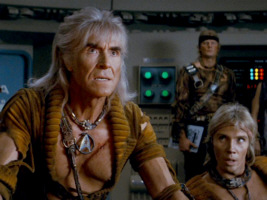
 Khan is vengeful in "Star Trek II"
Khan is vengeful in "Star Trek II"